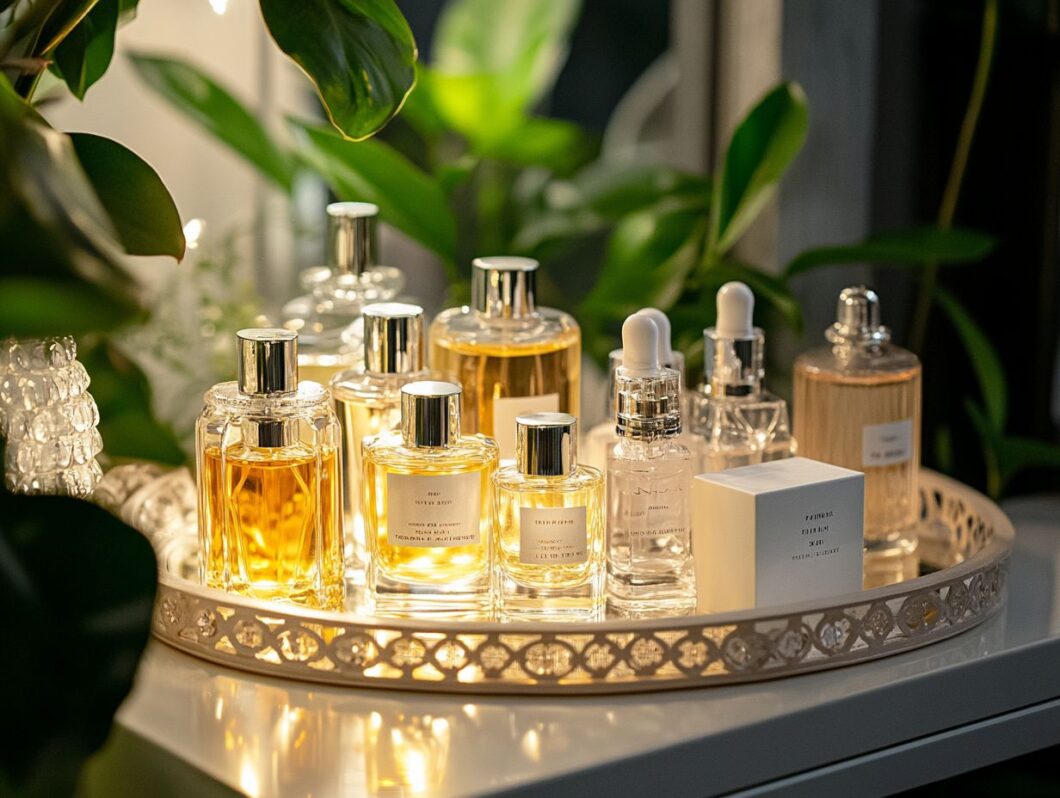Preserving the exquisite aroma of my favorite fragrances involves more than just a spritz; it begins with proper storage.
I often ponder why some perfumes seem to lose their charm over time. The way I store my scents can significantly influence their longevity and potency.
In this article, I will uncover the essentials of perfume storage—exploring best practices for both bottles and samples, sharing clever storage hacks using everyday items, highlighting common pitfalls to avoid, and offering tips for long-term preservation.
By understanding the importance of proper storage, I can keep my perfumes fresh and captivating.
Key Takeaways:
Why Proper Perfume Storage Matters
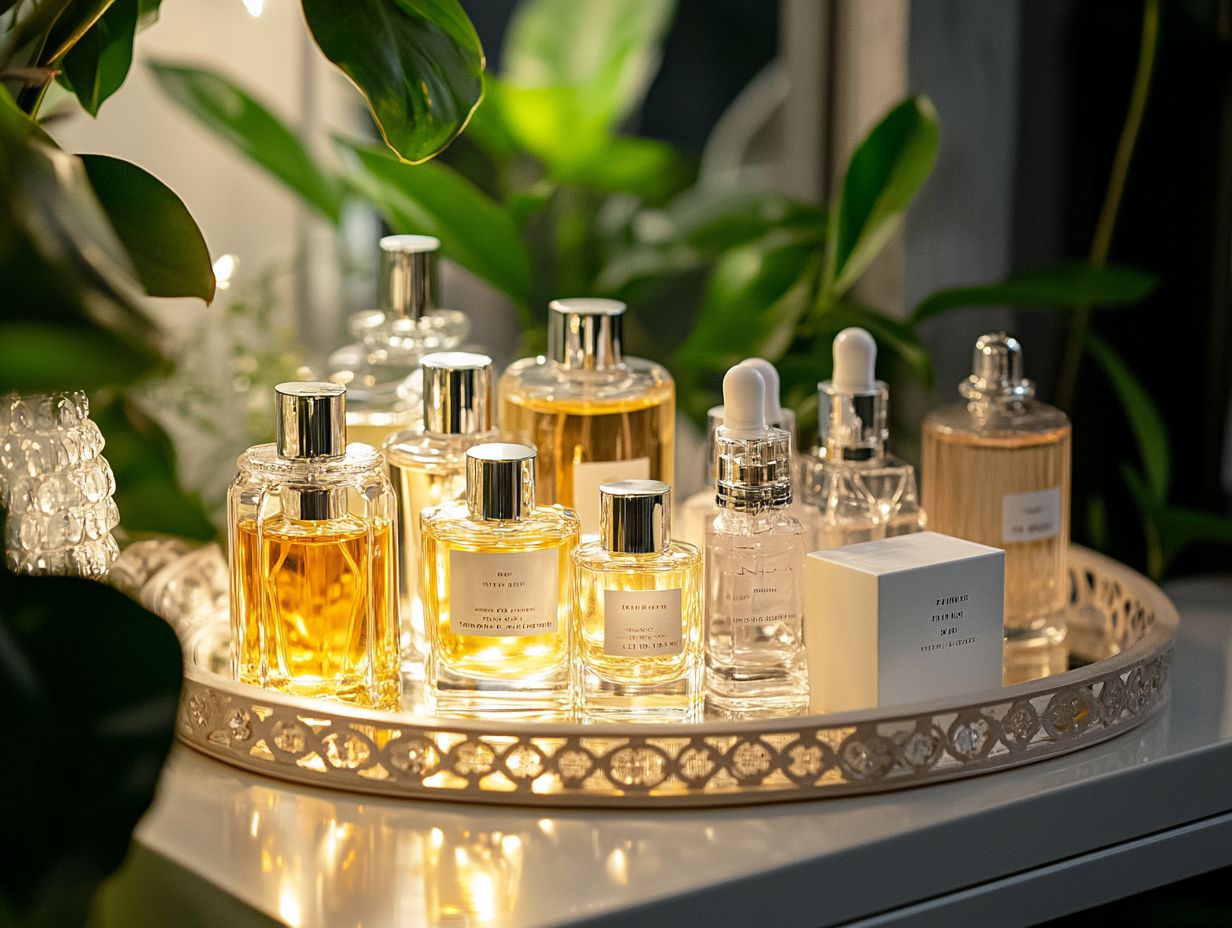
Proper perfume storage is essential for preserving the integrity and longevity of my cherished fragrances, ultimately enhancing my overall fragrance experience.
Just like essential oils, perfumes require thoughtful consideration to ensure they remain fresh and aromatic for as long as possible. I recognize that factors such as temperature fluctuations, humidity, and exposure to UV rays can significantly impact the quality of my perfumes.
By understanding the best practices for storing perfume, I can extend its lifespan and maintain the aromatic harmony intended by the creator, ensuring that every spritz delivers the signature scent I truly appreciate.
The Importance of Protecting Your Fragrances
Protecting fragrances is essential for maintaining their quality and ensuring their longevity, which can be compromised by common perfume mistakes, such as improper storage and exposure to harmful elements.
Factors like UV rays, humidity, and temperature fluctuations can significantly degrade the rich notes of a perfume over time, resulting in a fragrance that smells flat or unrecognizable.
To preserve the integrity of these aromatic treasures, I make it a priority to store them in a cool, dark place, away from direct sunlight and heat sources. Instead of placing them in a bathroom, which tends to have high humidity, I opt for a dry area like a closet.
I also ensure that the bottles are tightly sealed when not in use, as oxygen can alter the fragrance composition. By adopting these straightforward practices, I can enjoy my preferred scents for much longer, ensuring that each spritz resonates with the original allure.
Best Practices for Perfume Storage
Adopting best practices for perfume storage is essential for ensuring that my fragrances maintain their fresh and vibrant qualities over time, allowing me to fully enjoy my signature scent.
By implementing strategies such as keeping my perfumes in a cool, dark place and ensuring that the bottles are sealed tightly, I can protect my investment in essential oils and preserve their aromatic integrity.
Additionally, I have found that some perfume enthusiasts suggest storing fragrances in the refrigerator to further enhance their longevity, as long as I take care to avoid sudden temperature changes that could negatively impact the fragrance.
How to Store Perfume Bottles
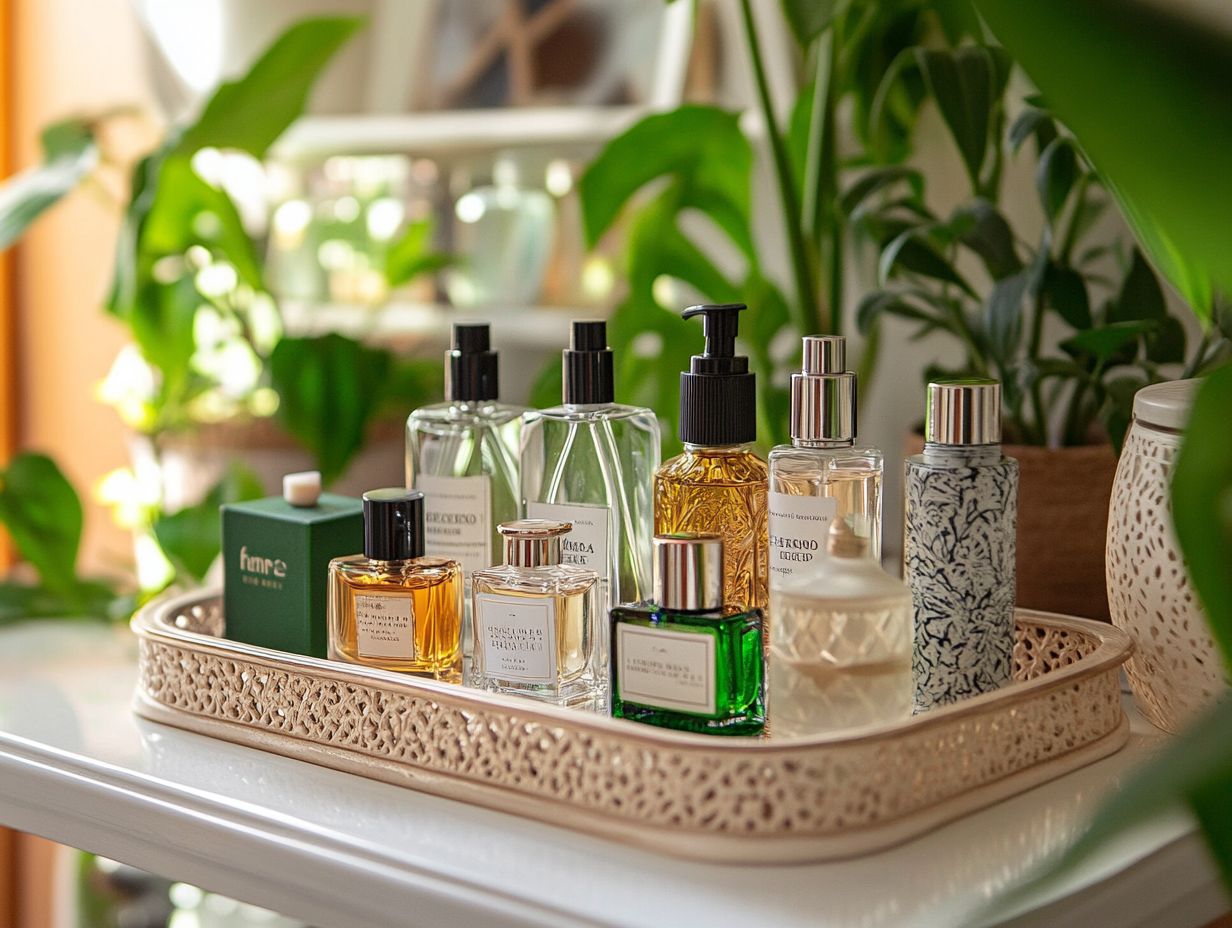
Storing perfume bottles properly involves several key considerations that I take seriously, including selecting the right environment and ensuring that each bottle is secure and protected from external factors that could compromise its integrity.
To preserve the delicate nature of fragrances, I find it advisable to place perfume bottles on low shelves or within closet cabinets, where they are less likely to be exposed to direct sunlight and fluctuating temperatures. This controlled environment helps prevent degradation and evaporative loss, which can occur with frequent exposure to air.
I also make it a point to secure the lid on each bottle, as this is essential for safeguarding the scent from evaporation and contamination. Choosing suitable fragrance containers, ideally those made from dark glass, is another practice I follow to protect the perfume from light and extend its lifespan.
By adhering to these simple yet effective storage practices, I can ensure that my precious scents remain vibrant and true to their intended essence.
How to Store Perfume Samples and Decants
Storing perfume samples and decants requires careful consideration to ensure that these smaller quantities of fragrances remain in optimal condition for my cosmetic care routine and fragrance journey.
To achieve this, I make it a priority to find a cool, dark space for storage, as both heat and light can compromise the delicate compositions of the scents. A closet or drawer is usually an excellent choice, as it protects the samples from excess humidity and temperature fluctuations. For those of us investing in a collection, using opaque containers can further safeguard the integrity of the product.
When purchasing samples or decants, I always opt for reputable sources that offer a variety of options, allowing me to experience different fragrances without the commitment of a full bottle. Additionally, I carefully check for proper sealing and expiration dates to enhance the longevity of my acquired scents.
Perfume Storage Hacks
To maximize the longevity and quality of my perfumes, I focus on implementing innovative storage techniques that utilize everyday items and natural materials.
This approach allows me to create an ideal environment for preserving the integrity of my fragrances.
Using Natural Materials for Storage
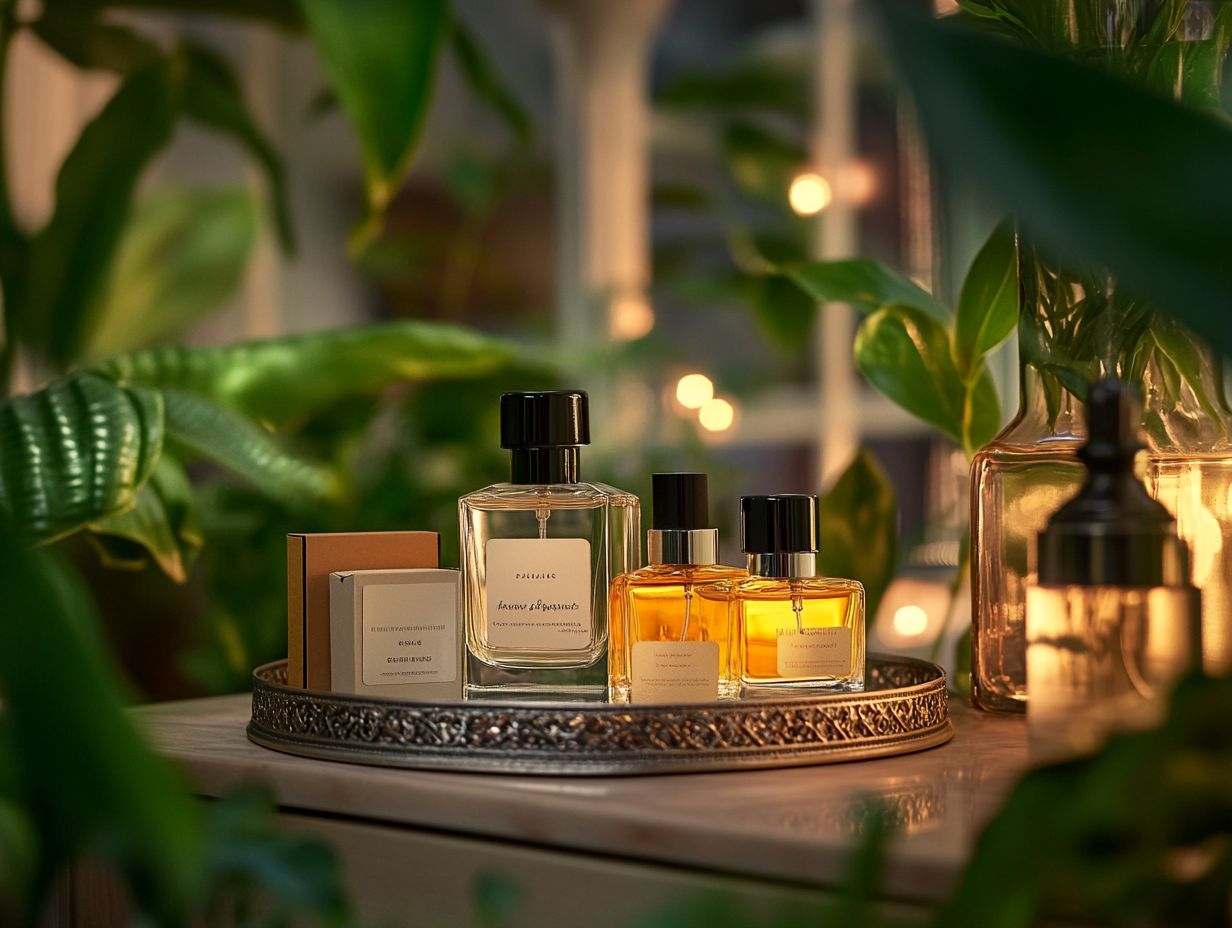
Using natural materials for perfume storage significantly enhances fragrance care, as they provide a protective barrier against environmental factors that can diminish the quality of essential oils.
For example, I find that materials such as bamboo, glass, and leather are both aesthetically appealing and functionally effective. Bamboo is a sustainable option that helps regulate moisture levels, preventing essential oils from degrading due to excess humidity.
Glass containers, being non-porous, protect scents from light exposure, which helps preserve their aromatic profiles for extended periods. While leather may not be as commonly used, it offers a unique combination of elegance and protection, ensuring that fragrances remain undisturbed by temperature fluctuations.
By incorporating these natural materials into my storage practices, I can fully appreciate the diverse notes of a perfume, maintaining their rich and complex character over time.
Utilizing Common Household Items
Utilizing common household items for perfume storage is an effective and budget-friendly approach to ensure my fragrances remain in excellent condition while contributing to the fragrance community’s collective knowledge on innovative storage practices.
Many enthusiasts may not realize that everyday items can serve as perfect storage solutions. For instance, I have found that repurposing a charming vintage teacup or a decorative jar can create a striking display for mini fragrance bottles.
Alternatively, an empty shoe box lined with soft fabric can provide a cozy and protected environment for larger perfumes. To keep scents separated and prevent unwanted mixing, I recommend using small compartments made from cardboard or plastic dividers.
It is also essential to store these items in a cool, dark area to preserve their quality.
I encourage fellow fragrance lovers to share their unique storage solutions, fostering creativity and inspiration within our community.
Common Mistakes to Avoid
I recognize that avoiding common perfume mistakes is essential for preserving the longevity and quality of my fragrances.
Even minor oversights can significantly impact the scent and overall experience.
Factors That Can Affect Perfume Quality
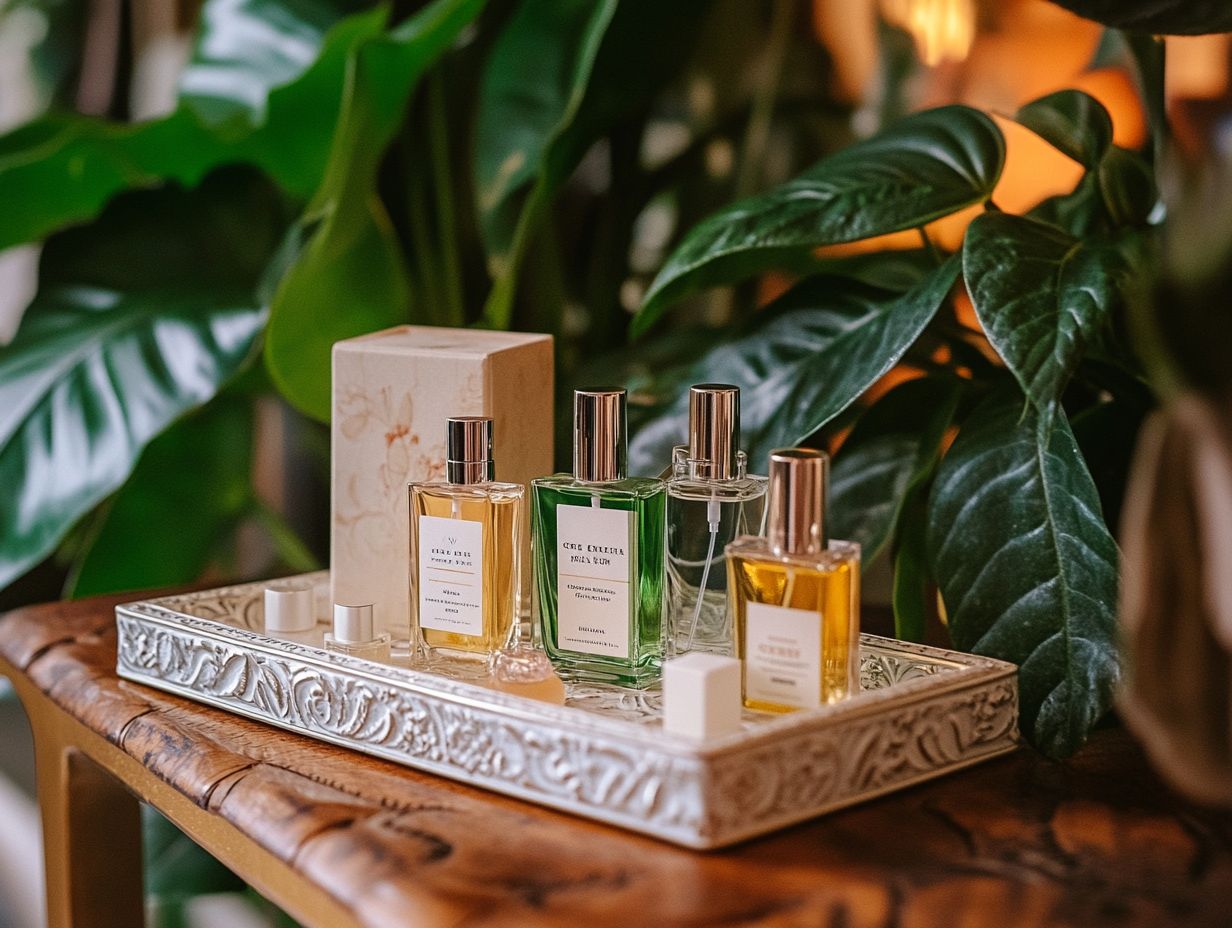
Several critical factors can impact the quality of perfume, including temperature fluctuations, exposure to light, and humidity levels. Each of these elements can significantly diminish the longevity of a fragrance.
These conditions can trigger chemical reactions that alter the scent profile, often resulting in a fragrance that may smell flat or even rancid over time. For example, higher temperatures can hasten the evaporation of lighter notes, while prolonged exposure to sunlight can degrade delicate oils, causing them to lose their vibrancy. Additionally, humidity can introduce moisture that contaminates the bottle, disrupting the intended balance of accords.
To maintain the integrity of the perfume, I recommend storing bottles in cool, dark places and ensuring that the lids are tightly sealed. Steering clear of bathrooms and other humid environments can also help preserve the essence of each fragrance, allowing for a delightful experience with every application.
Long-Term Storage Tips
Implementing effective long-term storage strategies is essential for maintaining the longevity and quality of my perfumes.
By doing so, I ensure that my cherished fragrances continue to retain their beauty over time.
Preserving Perfumes for Extended Periods
Preserving perfumes for extended periods requires careful attention to proper storage conditions. I ensure that factors such as temperature and light exposure are meticulously controlled to maintain the integrity of the fragrance.
I always keep fragrances in their original bottles, as they are specifically designed to protect the scent from environmental elements. It is essential to store them in a cool, dark place, away from direct sunlight and heat sources, which can degrade the components of the perfume.
Additionally, utilizing opaque or dark glass containers helps shield the delicate formulation from harmful light. Maintaining a consistent temperature is also crucial, as fluctuations can lead to chemical changes in the fragrance.
By paying careful attention to these preservation practices, I can enjoy my favorite scents for years without losing their unique character.


